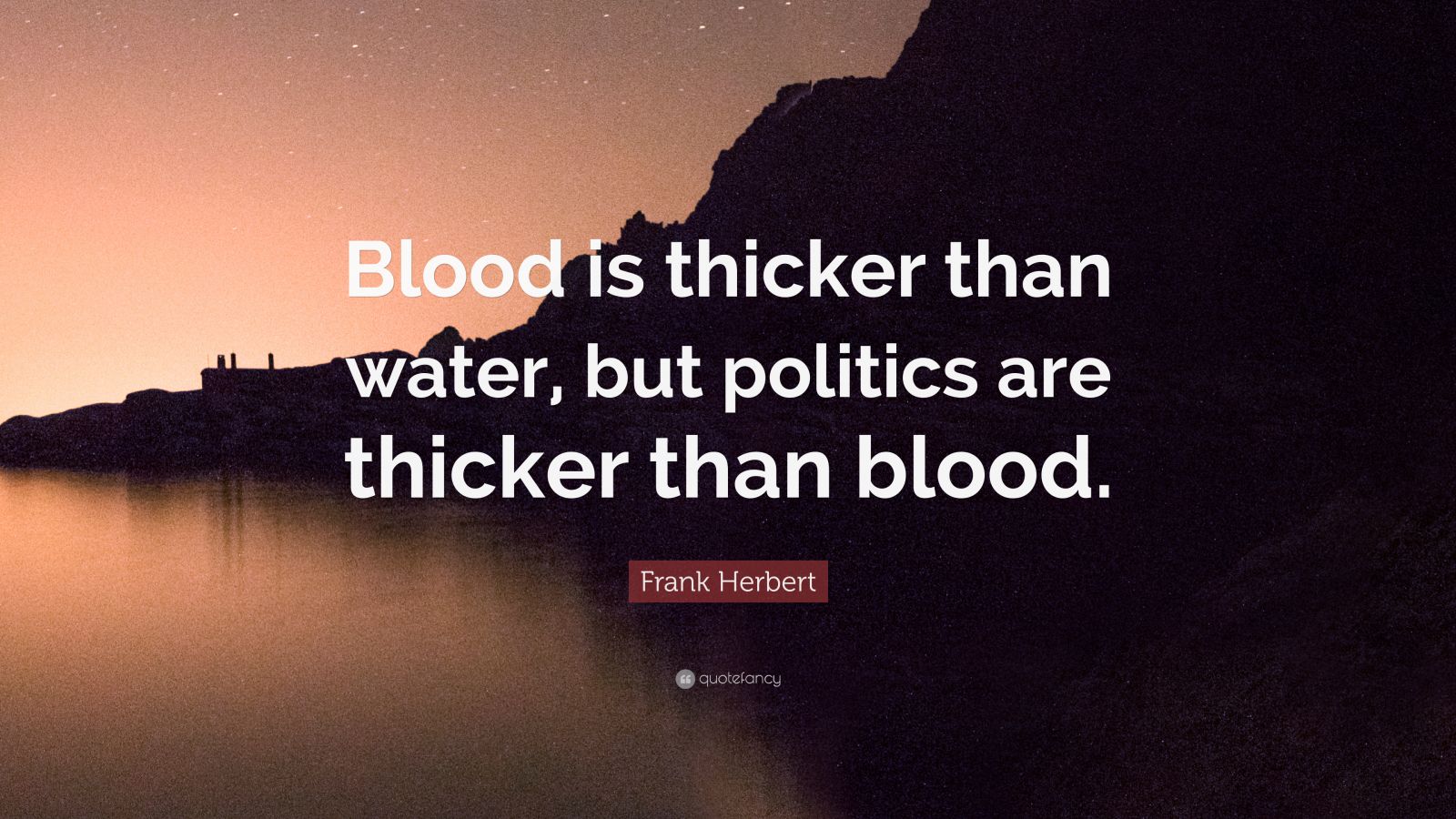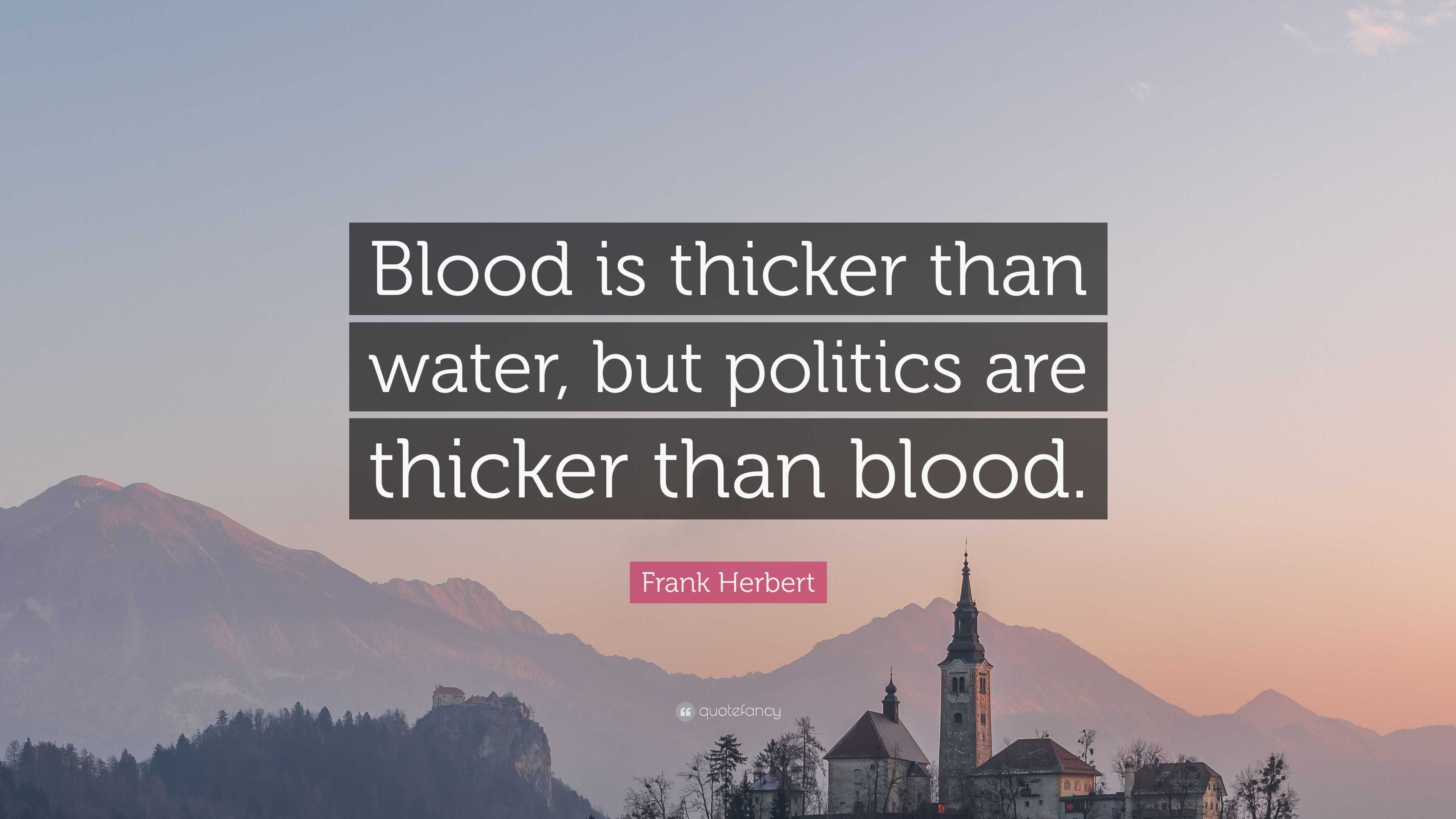Full Quote Blood Is Thicker Than Water: Understanding Its Meaning And Significance
“Blood is thicker than water” is a phrase that has been deeply embedded in our cultural lexicon for centuries. This idiom carries profound implications about family bonds, loyalty, and the connections that tie us together. However, many people may not know its origins or the full quote behind this famous saying. In this article, we will delve into the meaning, history, and significance of the phrase while exploring its applications in modern life.
The expression "blood is thicker than water" is often used to emphasize the importance of familial ties over other relationships. It suggests that blood relatives should take precedence in times of need, and their loyalty is unbreakable. But is this always true? As we explore further, you'll discover that the origins of the phrase might surprise you and that its meaning has evolved over time.
This article aims to provide a comprehensive understanding of the phrase, including its historical roots, cultural significance, and modern interpretations. By the end, you'll have a deeper appreciation for the complexities of family relationships and the enduring power of this famous saying.
- Discover The Vibrant Central Market Dallas Tx Your Ultimate Guide
- Salt Lake City Mall A Complete Guide To Shopping Dining And Entertainment
Table of Contents
- The Origin of "Blood is Thicker Than Water"
- The Full Quote Behind the Phrase
- Understanding the Meaning
- Historical Context and Evolution
- Cultural Significance
- Modern Interpretation and Usage
- Variations of the Phrase
- Famous Examples in Literature and Media
- Psychological Perspective on Family Bonds
- Conclusion and Call to Action
The Origin of "Blood is Thicker Than Water"
The phrase "blood is thicker than water" dates back centuries, with its origins rooted in ancient cultures. Contrary to popular belief, the saying was not originally intended to emphasize familial loyalty but rather had a different meaning entirely. The earliest recorded version of the phrase can be traced back to the Bible, where it was used in a military context to signify the bond between soldiers who had shed blood together in battle.
In medieval times, the phrase evolved to reflect the importance of family ties, but its meaning continued to shift depending on the cultural and historical context. By the 19th century, the phrase had become synonymous with the idea that blood relationships are stronger than any other type of bond.
Historical References
- The phrase appears in the Bible, specifically in Genesis 43:32, where it refers to the bond between brothers.
- In the 12th century, a German proverb stated, "Blood is thicker than water," emphasizing the importance of kinship over alliances.
- By the 1800s, the phrase had entered mainstream English literature and became widely used in its modern form.
The Full Quote Behind the Phrase
While most people are familiar with the shortened version "blood is thicker than water," the full quote provides a more nuanced understanding of its meaning. The original saying, "The blood of the covenant is thicker than the water of the womb," highlights the importance of shared experiences and commitments over mere biological connections.
- Spencer Cassadine General Hospital The Intriguing Character Who Stole Our Hearts
- How Old Is Dr Disrespect A Comprehensive Look At The Iconic Streamers Age Career And Legacy
This version of the phrase underscores the idea that relationships built on trust, sacrifice, and shared struggles can be just as strong, if not stronger, than those based solely on blood ties. Understanding the full quote sheds light on the complexity of human relationships and challenges the simplistic notion that family loyalty is always paramount.
Breaking Down the Full Quote
- "The blood of the covenant" refers to bonds formed through shared experiences, such as war, friendship, or marriage.
- "The water of the womb" symbolizes biological connections and family ties.
- Together, the full quote suggests that while family is important, other forms of connection can be equally significant.
Understanding the Meaning
At its core, the phrase "blood is thicker than water" is about prioritizing family relationships. It implies that blood relatives should come first in times of need and that their loyalty is unwavering. However, as we've seen, the full quote adds depth to this interpretation by acknowledging the value of other types of bonds.
In today's world, the meaning of the phrase has expanded to include a broader understanding of family. For many, family is not defined solely by biology but also by chosen relationships, such as friendships, partnerships, and communities. This shift reflects changing societal norms and a growing recognition of the importance of diverse relationships in our lives.
Key Takeaways
- The phrase emphasizes the importance of family loyalty.
- It acknowledges the strength of bonds formed through shared experiences.
- Modern interpretations recognize the value of chosen family and diverse relationships.
Historical Context and Evolution
The history of "blood is thicker than water" is a fascinating journey through time, reflecting the changing attitudes toward family and relationships. From its origins in ancient texts to its modern usage, the phrase has evolved to adapt to different cultural and social contexts.
In ancient societies, the phrase was often used to highlight the importance of loyalty among warriors and allies. Over time, it shifted to emphasize family ties, reflecting the growing significance of kinship in feudal and patriarchal societies. By the 19th century, the phrase had become a cornerstone of Western culture, symbolizing the enduring power of family bonds.
Key Historical Milestones
- Ancient Times: The phrase was used in military and religious contexts.
- Medieval Period: It emphasized the importance of family loyalty in feudal societies.
- 19th Century: The phrase became a popular saying in literature and everyday language.
Cultural Significance
The phrase "blood is thicker than water" holds significant cultural importance across the globe. In many societies, family is considered the foundation of social structure, and the phrase reflects this value system. However, interpretations of the phrase vary widely depending on cultural norms and traditions.
In collectivist cultures, such as those found in Asia and the Middle East, the phrase reinforces the importance of family loyalty and duty. In individualist cultures, such as those in Western countries, the phrase is often interpreted more broadly to include chosen family and personal relationships.
Cultural Variations
- In Japan, the concept of "giri" (duty) aligns with the idea of family loyalty.
- In the Middle East, extended family networks are central to social life, emphasizing the importance of blood ties.
- In Western cultures, the phrase is often used to highlight the tension between family obligations and personal freedom.
Modern Interpretation and Usage
In today's world, the phrase "blood is thicker than water" continues to resonate with people, but its meaning has expanded to include a wider range of relationships. With the rise of globalization and changing family structures, the traditional emphasis on blood ties has given way to a more inclusive understanding of family.
Many people now recognize that family is not defined solely by biology but also by the connections we choose to nurture. This shift reflects a growing appreciation for diverse relationships and the importance of building strong, supportive communities.
Modern Applications
- In literature and media, the phrase is often used to explore complex family dynamics.
- In psychology, it highlights the importance of attachment and bonding in human relationships.
- In everyday life, it serves as a reminder of the value of loyalty and commitment in all forms of relationships.
Variations of the Phrase
Over the years, the phrase "blood is thicker than water" has inspired numerous variations and adaptations. These variations reflect the diverse ways in which the phrase has been interpreted and applied in different contexts.
Some common variations include:
- "The ties that bind are stronger than the ties that divide."
- "Family is forever, friends are chosen."
- "Loyalty to those who have shared your struggles is more important than blood."
Famous Examples in Literature and Media
The phrase "blood is thicker than water" has appeared in countless works of literature, film, and television, often serving as a central theme or motif. These examples illustrate the enduring power of the phrase and its relevance to human experience.
In Shakespeare's "Hamlet," the theme of family loyalty is explored through the protagonist's conflicted relationship with his uncle. Similarly, in modern films like "The Godfather," the phrase is used to highlight the tension between family obligations and personal desires.
Notable Examples
- "Hamlet" by William Shakespeare
- "The Godfather" directed by Francis Ford Coppola
- "This Is Us" television series
Psychological Perspective on Family Bonds
From a psychological perspective, the phrase "blood is thicker than water" reflects the human need for connection and belonging. Family relationships, whether biological or chosen, play a crucial role in shaping our sense of identity and security.
Studies have shown that strong family bonds contribute to better mental health and well-being. However, toxic family relationships can have the opposite effect, leading to stress, anxiety, and depression. This highlights the importance of nurturing healthy relationships and setting boundaries when necessary.
Key Insights
- Family relationships provide a sense of identity and belonging.
- Healthy family bonds contribute to better mental health and well-being.
- Toxic relationships can have negative effects on mental health.
Conclusion and Call to Action
In conclusion, the phrase "blood is thicker than water" is a powerful reminder of the importance of family relationships and the bonds that tie us together. While its meaning has evolved over time, the core message remains relevant: loyalty and commitment are essential components of human connection.
We invite you to reflect on the relationships in your own life and consider how you can nurture and strengthen them. Whether through acts of kindness, open communication, or simply spending quality time together, small actions can make a big difference. Share your thoughts in the comments below or explore other articles on our site to learn more about the complexities of human relationships.
References:
- Shakespeare, W. (1600). Hamlet.
- Coppola, F. F. (1972). The Godfather.
- Psychology Today. (2021). The Importance of Family Bonds.
- Illinois Medical License Lookup A Comprehensive Guide To Verifying Healthcare Practitioners
- Mia Farrow Unveiling The Age And Journey Of An Iconic Actress

Frank Herbert Quote “Blood is thicker than water, but politics are

Frank Herbert Quote “Blood is thicker than water, but politics are

Frank Herbert Quote “Blood is thicker than water, but politics are